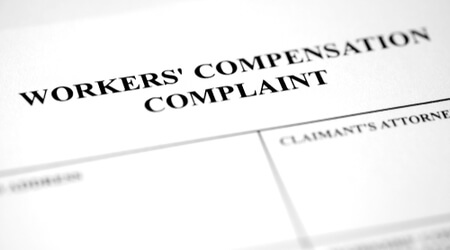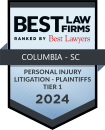
On-the-job accidents and injuries can occur in any type of job or occupation, and when they do, the impact on you and your family can be severe. You could be facing a mountain of medical expenses while being unable to return to work or perform certain tasks required by your job.
During difficult times such as these, workers’ compensation benefits can be a lifeline, helping you to get the medical treatment you need, while also ensuring you continue to receive paychecks to provide for yourself and your family.
At Joye Law Firm, our experienced Myrtle Beach workers’ compensation attorneys provide the kind of aggressive legal representation you need to get the benefits you are entitled to under the law. We’re proud to have achieved life-changing results for people who were injured at work in Myrtle Beach and surrounding areas, including a $1.25 million settlement for an injured truck driver, a $156,000 settlement for an injured mechanic, and a $150,000 settlement for an injured chef.
Types of Injuries Covered Under Workers’ Compensation
On-the-job accidents and injuries are an unfortunately common occurrence, both in South Carolina and throughout the United States.
Despite federal regulations and safety guidelines meant to protect workers against potentially harmful situations and dangerous substances, the latest statistics from the Occupational Safety and Health Administration (OSHA) indicate that there were as many as 15 work accident-related deaths every day in 2022, while around 2.7 workers out of 100 suffered injuries or illnesses on the job each day that same year.
According to OSHA, common types of on-the-job injuries include the following:
- Injuries caused by slip, trip, and fall accidents, such as muscle strains and sprains, broken bones, and head injuries
- Injuries due to being caught in or between objects or equipment, including back injuries and damage to internal organs
- Injuries caused by being struck by falling objects or work debris, including concussions, traumatic brain injuries, and severe cuts and lacerations
- Injuries due to electrocution and thermal or chemical burns
- Injuries caused by motor vehicle related accidents, such as broken bones, dislocated joints, and back or head injuries
- Injuries that occur as the result of repetitive tasks and poor work ergonomics, such as tendinitis, back strain, and carpal tunnel syndrome
- Chronic illness resulting from exposure to hazardous substances, such as asbestosis and certain types of cancer
Workers most at risk for on-the-job injuries include construction workers, manufacturing and warehouse workers, healthcare workers, firefighters, police, and other public safety officials.
Workers whose jobs may appear to be less dangerous, such as office workers, restaurant workers, and retail employees, are also at risk, with the simple fact being that any type of worker, in any type of field, can find themselves facing situations in which an on-the-job injury or illness could occur.
For a free review of your case, call us now!
What Should You Do if You Suffer an Injury While Working in Myrtle Beach?
If you’re injured at work, it’s important to take the following steps to ensure your health is addressed and your rights are protected:
- Seek Immediate Medical Attention: Your health is the top priority. If the injury is severe or life-threatening, seek emergency medical care immediately. For less severe injuries, you should still seek medical attention promptly to assess and document your injury.
- Report the Injury to Your Employer: Notify your supervisor or employer about the injury as soon as possible. South Carolina requires that injured employees report their workplace injury within 90 days to be eligible for workers’ compensation benefits. Provide details about how, when, and where the injury occurred.
- Document Everything: Keep detailed records of everything related to your injury and treatment. This includes keeping copies of medical records, receipts, a diary of your symptoms, and any correspondence related to your injury.
- File a Workers’ Compensation Claim: Obtain and fill out the necessary workers’ compensation claim forms from your employer, which is a separate process from reporting your injury. Make sure to fill out the forms accurately to avoid delays in processing your claim.
- Follow Medical Advice: Follow the treatment plan and advice given by your workers’ comp appointed healthcare provider. Attend all medical appointments and physical therapy sessions. Failing to follow medical advice can impact your workers’ compensation benefits.
- Understand Your Rights and Benefits: Familiarize yourself with your rights under South Carolina’s workers’ compensation laws. Benefits can include coverage for medical expenses, wage replacement, and physical and vocational rehabilitation services.
- Contact an Experienced Myrtle Beach Workers’ Compensation Lawyer: Applying for workers’ compensation benefits isn’t easy, especially when you go it alone while dealing with a serious injury. Having experienced legal representation on your side not only increases your chances of success, but also gives you peace of mind.
What Are the Rights and Responsibilities of Injured Workers in South Carolina?
In South Carolina, injured workers who file for workers’ compensation often have the right to certain benefits, but they also have the responsibility to follow proper procedures to receive those benefits.
Rights of Injured Workers
- Right to Medical Treatment: Injured workers have the right to receive necessary medical treatment for their work-related injuries. The employer or the insurance carrier typically selects the healthcare provider.
- Right to Disability Compensation: If the injury leads to temporary or permanent disability, workers have the right to receive disability compensation. This includes compensation for lost wages and benefits related to permanent injuries or impairments.
- Right to Choose a Doctor, in Certain Cases: If an employer fails to provide adequate medical treatment, the worker may have the right to choose their own doctor, but this usually requires approval from the South Carolina Workers’ Compensation Commission.
- Right to Be Represented by an Attorney: Workers have the right to hire an attorney to represent them in their workers’ compensation case, especially in situations involving disputes.
- Right to Appeal Decisions: If a claim is denied or if there is a disagreement with the benefits awarded, workers have the right to appeal the decision and have their case heard before the Workers’ Compensation Commission.
Responsibilities of Injured Workers
- Report the Injury Promptly: Workers must report their injury to their employer as soon as possible. In South Carolina, the formal deadline for reporting is within 90 days of the injury.
- File a Claim on Time: Workers must file a workers’ compensation claim in a timely manner. In South Carolina, the deadline for filing a claim is generally two years from the date of the injury.
- Seek and Follow Medical Treatment: Workers are responsible for seeking medical treatment and following the medical advice and instructions given by their healthcare provider.
- Cooperate with the Employer and Insurer: Workers should cooperate in the investigation and processing of their claim, including attending required medical examinations from approved healthcare providers and providing necessary information.
- Inform the Employer and Insurance Carrier About Recovery and Work Status: Workers must inform their employer and the insurance carrier about their recovery progress and their ability to return to work, including any work restrictions advised by their healthcare provider.
South Carolina Workers’ Comp Benefits You May Be Entitled To
Under Title 42 of the South Carolina Code of Laws, workers’ compensation provides sick and injured workers a variety of benefits, depending on the type and severity of the injury or illness they suffer.
Types of workers’ compensation benefits available in South Carolina include the following:
- Medical Benefits: Medical benefits available through workers’ compensation include visits with primary doctors and specialists, costs associated with hospital treatments (both inpatient and outpatient), medical testing required to diagnose and treat your condition, physical rehabilitation costs, and expenses due to the need for medications and medical aids, such as wheelchairs and braces.
- Temporary Disability Benefits: When your injury or illness results in temporary disabilities that prevent you from working or from performing certain tasks at your job, you may be eligible for temporary disability benefits, based on a percentage of your average earnings. Partial benefits apply if you are able to return to work but unable to work a full schedule, while total disability benefits would apply if your injury or illness temporarily prevents you from working at all.
- Permanent Disability Benefits: When your injury or illness results in permanent disabilities, you may be entitled to permanent disability benefits. If your doctor states that you have reached a level of maximum medical improvement, yet you are still unable to perform certain tasks on your job or to work a full schedule, permanent partial disability benefits would apply.
- Death Benefits: In the event a job-related injury or illness results in death, the victim’s family may be entitled to receive death benefits. Benefits available include money for burial expenses and transportation costs, as well as compensation to spouses and dependents of the deceased for partial lost wages and future lost earnings.
Understanding the Workers’ Compensation Process in South Carolina
The workers’ compensation process in South Carolina is overseen by the South Carolina Workers’ Compensation Commission, and generally involves the following steps:
- Injury Or Illness Occurs: The employee should report the injury or illness to their employer as soon as possible. In South Carolina, the employee generally has 90 days to report the injury to their employer, but is encouraged to do so immediately.
- Employer Is Notified: Once notified, the employer is required to report the injury to their workers’ compensation insurance carrier. This should be done promptly to avoid delays in benefits.
- Medical Treatment Is Administered: The injured employee is entitled to receive necessary medical treatment. The employer or the insurance carrier will typically choose the healthcare provider.
- Benefits Claim Is Filed: If the employer or the insurance carrier denies the worker’s claim or the employee believes they are not receiving the correct benefits, the employee can file a claim with the South Carolina Workers’ Compensation Commission. This is done by filing a Form 50 or Form 52, detailing the injury and the compensation sought.
- Benefits Are Awarded: If the claim is accepted, the employee may receive various benefits, including medical expenses, compensation for lost wages (typically two-thirds of the employee’s average weekly wage, up to a legal maximum), and compensation for permanent disability or disfigurement.
- Hearing Occurs in The Event of Dispute: If there is a dispute regarding the claim, a hearing may be held before a Commissioner. Both the employee and the employer can present evidence and arguments. The Commissioner then makes a decision based on the law and the facts presented.
- Appeal Process Begins: If either party is dissatisfied with the Commissioner’s decision, they can appeal to the full Workers’ Compensation Commission.
How Does Receiving Workers’ Compensation Benefits Affect Employment?
Receiving workers’ compensation benefits can have several impacts on a worker’s employment, although these impacts vary based on individual circumstances, the nature and severity of the injury, and the policies of the employer.
Here are some potential effects:
Job Security
Generally, workers’ compensation laws protect employees from being fired solely because they have filed a workers’ compensation claim.
Return to Work
Employers may offer or require the injured worker to return to work in a light-duty or modified capacity as part of a transitional return-to-work program. This can impact the worker’s duties, work hours, and possibly their pay, depending on the new role’s nature.
If an employee is unable to return to their previous position due to the injury, they may be entitled to vocational rehabilitation services to help them find suitable employment.
Benefit Coordination
Receiving workers’ compensation benefits may impact other benefits, such as paid leave or health insurance. For instance, an employee may need to use their sick leave or vacation days concurrently with workers’ compensation in some policies.
In some cases, if the injury results in a long-term disability, the worker might transition from workers’ compensation benefits to long-term disability insurance (if available).
Non-Retaliation
Laws typically protect employees from retaliation or discrimination due to filing a workers’ compensation claim. This means an employer cannot demote, harass, reduce pay, or take other negative actions against an employee simply because they have filed a claim.
Impact on Future Employment
While having a history of a workers’ compensation claim should not impact future employment opportunities, some workers may face challenges. For example, if the injury leads to a permanent disability, the worker may need to seek jobs that accommodate their physical capabilities.
Privacy and Confidentiality
Employees might be concerned about their privacy. Information regarding their injury and medical condition will be shared with their employer and the insurance company, but this information should be kept confidential and used only concerning the workers’ compensation claim and related employment matters.
What If Your Myrtle Beach Workers’ Compensation Claim Has Been Denied?
Has your South Carolina workers’ compensation claim been denied, or do you have a dispute involving the benefits you have been awarded? If so, our experienced workers’ compensation attorneys can help.
Through the South Carolina Workers’ Compensation Commission (WCC), you have the right to appeal your denial or any decision made concerning your claim. The Commission is responsible for overseeing and managing our state workers’ compensation program, and is authorized with the power to review decisions concerning benefits claims.
Your first step in filing a dispute is to request a hearing in which you will be allowed to present evidence in support of your claim, such as medical records and doctor statements.
Should you disagree with that decision, you have the right to pursue your claim further, all the way to the South Carolina Court of Appeals. At Joye Law Firm, we provide the kind of experienced legal representation that can help you get the results you need to be successful during the appeals process, increasing your chances of getting a more favorable decision.
Let Our Myrtle Beach Workers’ Comp Lawyers Assist You
When you or someone you care about has suffered an on-the-job injury or illness, contact our experienced Myrtle Beach workers’ compensation attorneys right away. At Joye Law Firm, we provide the knowledge and skill you need at a time like this, to assist you in getting the benefits you are entitled to.
While we handle claims statewide, the attorneys in our Myrtle Beach office primarily handle workers’ comp cases in Horry, Florence, Dillon, Georgetown, Chesterfield, Clarendon, Darlington, Lee, Marion, Marlboro, Sumter, and Williamsburg counties.
Since 1968, Joye Law Firm has helped tens of thousands of injured workers in South Carolina receive the benefits they deserve. Let us put our experience to work for you, Just Call Joye at 888-324-3100.



























